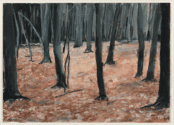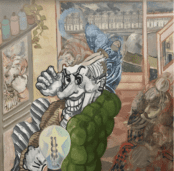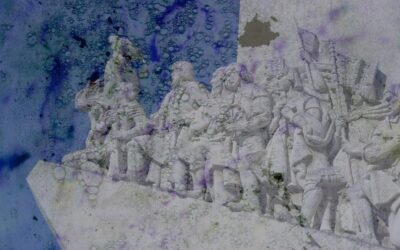[dropcap style=”font-size:100px; color:#992211;”]T[/dropcap]he Idiots and the Enlightened wandering through the dark west….
In 1806 the philosopher Georg Hegel witnessed Napoleon riding into Jena. Hegel wrote to a friend:
I saw the Emperor – this world-soul – riding out of the city on reconnaissance. It is indeed a wonderful sensation to see such an individual, who, concentrated here at a single point, astride a horse, reaches out over the world and masters it … this extraordinary man, whom it is impossible not to admire.
– G.W.F. Hegel ¹
Harper’s Magazine² imagines the encounter (image, right). This may be a more realistic imagining, but it is surely the artist Jacques-Louis David’s work which better portrays what Hegel had in mind. What David saw was an Apollonian master, a new embodiment of an ancient value, a great man, graceful impressive and able.
In his book The French Revolution George Rudé describes Napoleon as a “rare combination of will, intellect and physical vigour.”³
It is charming to consider that Napoleon, whilst sitting for David’s masterful propaganda piece impatiently complained:
“— Sit? For what good? Do you think that the great men of Antiquity for whom we have images sat?
— But Citizen First Consul, I am painting you for your century, for the men who have seen you, who know you, they will want to find a resemblance.
— A resemblance? It isn’t the exactness of the features, a wart on the nose which gives the resemblance. It is the character that dictates what must be painted…. Nobody knows if the portraits of the great men resemble them, it is enough that their genius lives there”ª
Of course, a thousand shadows can be cast on any perfect ideal of Napoleon the real man. He was after all a military leader. It is also true that while David’s piece is propaganda, Napoleon really did have the qualities attributed to him. His intellect was informed by a voracious appetite for reading:
[Napoleon] was then a passionate admirer of Jean-Jacques [Rousseau]; … a fan of the masterpieces of Corneille, Racine and Voltaire. He brought the works of Plutarch, Plato, Cicero, Cornelius Nepos, Livy and Tacitus, translated into French; and those of Montaigne, Montesquieu and Raynal. All of these works filled a trunk larger than the one that contained his toiletries. I don’t deny that he also had the poems of Ossianº
His skill in battle cannot be disputed and his charisma won him friends and lovers. Even Wellington, who had great cause to be critical of Napoleon, was clear, “I used to say of him [Napoleon] that his presence on the field made the difference of forty thousand men.” What Wellington and Hegel were reacting to was a man as close as damn it to the lofty ideals their own time demanded for an individual to be considered great.
Napoleon Crossing the Alps, Jacques-Louis David 1801. Oil on canvas
Who embodies our time? Who is the world soul? Our time of unbridled consumption, of celebrity kitsch, of buzz words and one liners. Our time of Irony. Trump is the portrait getting uglier and uglier. Unlike Dorian Gray the image is not locked away in the attic, he’s there and we can watch our collective world soul become more and more corrupt. He’s us our own needy self-aggrandising selves living his life to the max (heave), mocking himself (think comedy roast), enjoying wealth and power. All this, not in a way that intimidates us with taste or with serious gravitas but with Jets, fast cars and gaudy gold rooms.
A new dark age is upon us, the experts, intellectuals and established politicians are powerless to stop this assault.
We have the world leader we deserve! A coarse, greedy billionaire to rule us like the fools we are! If Trump turns out to be a limp president or indeed any type of anti-climax rather than a catastrophe, it will be luck rather than judgement. Whatever happens, we have a much more pressing problem: millions of people in America and around the world have disregarded stupidity, aggression, misogyny and glib posturing to support, defend and now elect Donald Trump as the most politically powerful man in the world.
This is not only an American problem. Across the western world the sort of rhetoric and tone of Trump’s campaign is being used by many parties (Marine Le Pen and Nigel Farage spring to mind). That such a person should be elected to power says far more about us than it does him and it is all of us, not only the supporters of such politics, who need to take stock.
What has happened to our society, where shame no longer functions to bar people from public life; where the value of courtesy and politeness has waned to such an extent that a president can describe an old man who doesn’t want to move from his family home as a pig and a slob; (Trump, like a Disney villain, was building a golf club for millionaires) or talk about women like he should be investigated by Operation Yewtree?
That this is possible is a failure of institutions, educators, politicians and of course the individual. Why then, is the council of the wise ignored?
To be continued
¹Hegel: The Letters, translated by Clark Butler and Christine Seiler with commentary by Clark Butler, Indiana University Press, Bloomington, © Purdue Research Foundation.
²G.W.F.Hegel meets Napoleon in Jena 1806. Image from Harper’s Magazine 1895
³George F. E. Rudé (1988). The French Revolution.
ªAntoine-Claire Thibaudeau, Histoire Générale de Napoléon Bonaparte, Vol. 6 (Paris, 1828), p. 330.
ºDu Casse, ed., Mémoires et Correspondance Politique et Militaire du Roi Joseph, Vol. I (Paris, 1855), pp. 32-33.

Michael Eden is a visual artist, researcher and writer at the University of Arts London exploring relationships between monstrosity, subjectivity and landscape representation.



















